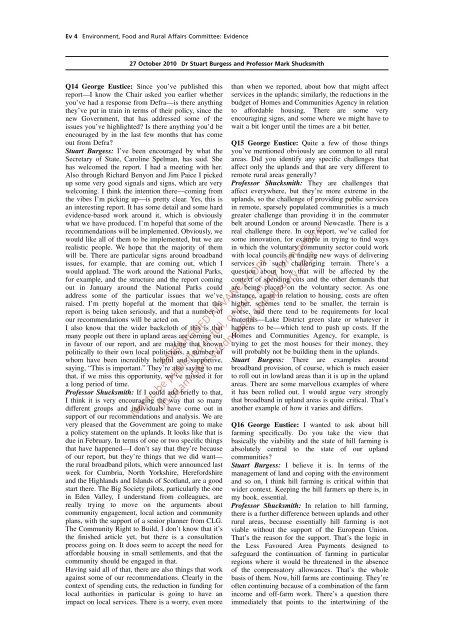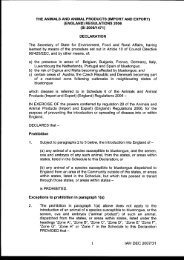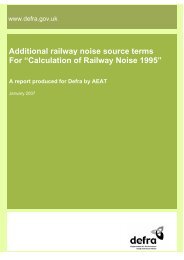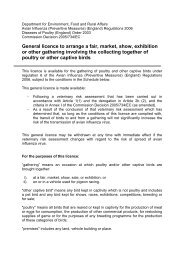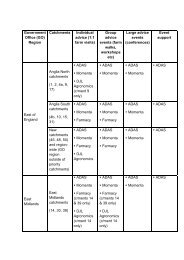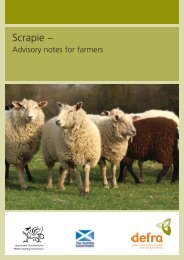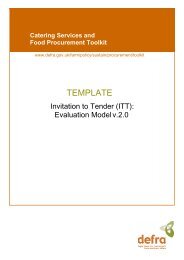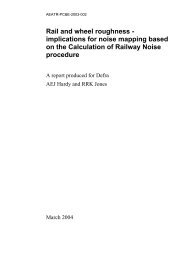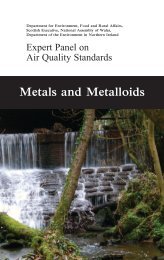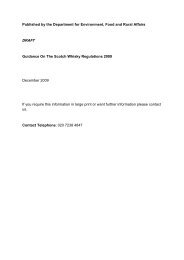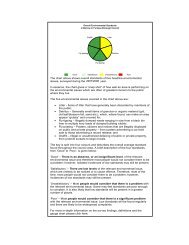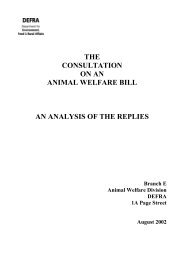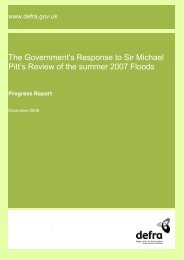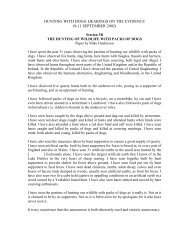Farming in the Uplands - ARCHIVE: Defra
Farming in the Uplands - ARCHIVE: Defra
Farming in the Uplands - ARCHIVE: Defra
Create successful ePaper yourself
Turn your PDF publications into a flip-book with our unique Google optimized e-Paper software.
Ev 4 Environment, Food and Rural Affairs Committee: Evidence<br />
27 October 2010 Dr Stuart Burgess and Professor Mark Shucksmith<br />
Q14 George Eustice: S<strong>in</strong>ce you’ve published this<br />
report—I know <strong>the</strong> Chair asked you earlier whe<strong>the</strong>r<br />
you’ve had a response from <strong>Defra</strong>—is <strong>the</strong>re anyth<strong>in</strong>g<br />
<strong>the</strong>y’ve put <strong>in</strong> tra<strong>in</strong> <strong>in</strong> terms of <strong>the</strong>ir policy, s<strong>in</strong>ce <strong>the</strong><br />
new Government, that has addressed some of <strong>the</strong><br />
issues you’ve highlighted? Is <strong>the</strong>re anyth<strong>in</strong>g you’d be<br />
encouraged by <strong>in</strong> <strong>the</strong> last few months that has come<br />
out from <strong>Defra</strong>?<br />
Stuart Burgess: I’ve been encouraged by what <strong>the</strong><br />
Secretary of State, Carol<strong>in</strong>e Spelman, has said. She<br />
has welcomed <strong>the</strong> report. I had a meet<strong>in</strong>g with her.<br />
Also through Richard Benyon and Jim Paice I picked<br />
up some very good signals and signs, which are very<br />
welcom<strong>in</strong>g. I th<strong>in</strong>k <strong>the</strong> <strong>in</strong>tention <strong>the</strong>re—com<strong>in</strong>g from<br />
<strong>the</strong> vibes I’m pick<strong>in</strong>g up—is pretty clear. Yes, this is<br />
an <strong>in</strong>terest<strong>in</strong>g report. It has some detail and some hard<br />
evidence-based work around it, which is obviously<br />
what we have produced. I’m hopeful that some of <strong>the</strong><br />
recommendations will be implemented. Obviously, we<br />
would like all of <strong>the</strong>m to be implemented, but we are<br />
realistic people. We hope that <strong>the</strong> majority of <strong>the</strong>m<br />
will be. There are particular signs around broadband<br />
issues, for example, that are com<strong>in</strong>g out, which I<br />
would applaud. The work around <strong>the</strong> National Parks,<br />
for example, and <strong>the</strong> structure and <strong>the</strong> report com<strong>in</strong>g<br />
out <strong>in</strong> January around <strong>the</strong> National Parks could<br />
address some of <strong>the</strong> particular issues that we’ve<br />
raised. I’m pretty hopeful at <strong>the</strong> moment that this<br />
report is be<strong>in</strong>g taken seriously, and that a number of<br />
our recommendations will be acted on.<br />
I also know that <strong>the</strong> wider backcloth of this is that<br />
many people out <strong>the</strong>re <strong>in</strong> upland areas are com<strong>in</strong>g out<br />
<strong>in</strong> favour of our report, and are mak<strong>in</strong>g that known<br />
politically to <strong>the</strong>ir own local politicians, a number of<br />
whom have been <strong>in</strong>credibly helpful and supportive,<br />
say<strong>in</strong>g, “This is important.” They’re also say<strong>in</strong>g to me<br />
that, if we miss this opportunity, we’ve missed it for<br />
a long period of time.<br />
Professor Shucksmith: If I could add briefly to that,<br />
I th<strong>in</strong>k it is very encourag<strong>in</strong>g <strong>the</strong> way that so many<br />
different groups and <strong>in</strong>dividuals have come out <strong>in</strong><br />
support of our recommendations and analysis. We are<br />
very pleased that <strong>the</strong> Government are go<strong>in</strong>g to make<br />
a policy statement on <strong>the</strong> uplands. It looks like that is<br />
due <strong>in</strong> February. In terms of one or two specific th<strong>in</strong>gs<br />
that have happened—I don’t say that <strong>the</strong>y’re because<br />
of our report, but <strong>the</strong>y’re th<strong>in</strong>gs that we did want—<br />
<strong>the</strong> rural broadband pilots, which were announced last<br />
week for Cumbria, North Yorkshire, Herefordshire<br />
and <strong>the</strong> Highlands and Islands of Scotland, are a good<br />
start <strong>the</strong>re. The Big Society pilots, particularly <strong>the</strong> one<br />
<strong>in</strong> Eden Valley, I understand from colleagues, are<br />
really try<strong>in</strong>g to move on <strong>the</strong> arguments about<br />
community engagement, local action and community<br />
plans, with <strong>the</strong> support of a senior planner from CLG.<br />
The Community Right to Build, I don’t know that it’s<br />
<strong>the</strong> f<strong>in</strong>ished article yet, but <strong>the</strong>re is a consultation<br />
process go<strong>in</strong>g on. It does seem to accept <strong>the</strong> need for<br />
affordable hous<strong>in</strong>g <strong>in</strong> small settlements, and that <strong>the</strong><br />
community should be engaged <strong>in</strong> that.<br />
Hav<strong>in</strong>g said all of that, <strong>the</strong>re are also th<strong>in</strong>gs that work<br />
aga<strong>in</strong>st some of our recommendations. Clearly <strong>in</strong> <strong>the</strong><br />
context of spend<strong>in</strong>g cuts, <strong>the</strong> reduction <strong>in</strong> fund<strong>in</strong>g for<br />
local authorities <strong>in</strong> particular is go<strong>in</strong>g to have an<br />
impact on local services. There is a worry, even more<br />
than when we reported, about how that might affect<br />
services <strong>in</strong> <strong>the</strong> uplands; similarly, <strong>the</strong> reductions <strong>in</strong> <strong>the</strong><br />
budget of Homes and Communities Agency <strong>in</strong> relation<br />
to affordable hous<strong>in</strong>g. There are some very<br />
encourag<strong>in</strong>g signs, and some where we might have to<br />
wait a bit longer until <strong>the</strong> times are a bit better.<br />
Q15 George Eustice: Quite a few of those th<strong>in</strong>gs<br />
you’ve mentioned obviously are common to all rural<br />
areas. Did you identify any specific challenges that<br />
affect only <strong>the</strong> uplands and that are very different to<br />
remote rural areas generally?<br />
Professor Shucksmith: They are challenges that<br />
affect everywhere, but <strong>the</strong>y’re more extreme <strong>in</strong> <strong>the</strong><br />
uplands, so <strong>the</strong> challenge of provid<strong>in</strong>g public services<br />
<strong>in</strong> remote, sparsely populated communities is a much<br />
greater challenge than provid<strong>in</strong>g it <strong>in</strong> <strong>the</strong> commuter<br />
belt around London or around Newcastle. There is a<br />
real challenge <strong>the</strong>re. In our report, we’ve called for<br />
some <strong>in</strong>novation, for example <strong>in</strong> try<strong>in</strong>g to f<strong>in</strong>d ways<br />
<strong>in</strong> which <strong>the</strong> voluntary community sector could work<br />
with local councils <strong>in</strong> f<strong>in</strong>d<strong>in</strong>g new ways of deliver<strong>in</strong>g<br />
services <strong>in</strong> such challeng<strong>in</strong>g terra<strong>in</strong>. There’s a<br />
question about how that will be affected by <strong>the</strong><br />
context of spend<strong>in</strong>g cuts and <strong>the</strong> o<strong>the</strong>r demands that<br />
are be<strong>in</strong>g placed on <strong>the</strong> voluntary sector. As one<br />
<strong>in</strong>stance, aga<strong>in</strong> <strong>in</strong> relation to hous<strong>in</strong>g, costs are often<br />
higher, schemes tend to be smaller, <strong>the</strong> terra<strong>in</strong> is<br />
worse, and <strong>the</strong>re tend to be requirements for local<br />
materials—Lake District green slate or whatever it<br />
happens to be—which tend to push up costs. If <strong>the</strong><br />
Homes and Communities Agency, for example, is<br />
try<strong>in</strong>g to get <strong>the</strong> most houses for <strong>the</strong>ir money, <strong>the</strong>y<br />
will probably not be build<strong>in</strong>g <strong>the</strong>m <strong>in</strong> <strong>the</strong> uplands.<br />
Stuart Burgess: There are examples around<br />
broadband provision, of course, which is much easier<br />
to roll out <strong>in</strong> lowland areas than it is up <strong>in</strong> <strong>the</strong> upland<br />
areas. There are some marvellous examples of where<br />
it has been rolled out. I would argue very strongly<br />
that broadband <strong>in</strong> upland areas is quite critical. That’s<br />
ano<strong>the</strong>r example of how it varies and differs.<br />
EMBARGOED ADVANCE COPY:<br />
Not to be published <strong>in</strong> full, or part, <strong>in</strong> any form before<br />
00.01am GMT Wednesday 16 February 2011<br />
Q16 George Eustice: I wanted to ask about hill<br />
farm<strong>in</strong>g specifically. Do you take <strong>the</strong> view that<br />
basically <strong>the</strong> viability and <strong>the</strong> state of hill farm<strong>in</strong>g is<br />
absolutely central to <strong>the</strong> state of our upland<br />
communities?<br />
Stuart Burgess: I believe it is. In terms of <strong>the</strong><br />
management of land and cop<strong>in</strong>g with <strong>the</strong> environment<br />
and so on, I th<strong>in</strong>k hill farm<strong>in</strong>g is critical with<strong>in</strong> that<br />
wider context. Keep<strong>in</strong>g <strong>the</strong> hill farmers up <strong>the</strong>re is, <strong>in</strong><br />
my book, essential.<br />
Professor Shucksmith: In relation to hill farm<strong>in</strong>g,<br />
<strong>the</strong>re is a fur<strong>the</strong>r difference between uplands and o<strong>the</strong>r<br />
rural areas, because essentially hill farm<strong>in</strong>g is not<br />
viable without <strong>the</strong> support of <strong>the</strong> European Union.<br />
That’s <strong>the</strong> reason for <strong>the</strong> support. That’s <strong>the</strong> logic <strong>in</strong><br />
<strong>the</strong> Less Favoured Area Payments designed to<br />
safeguard <strong>the</strong> cont<strong>in</strong>uation of farm<strong>in</strong>g <strong>in</strong> particular<br />
regions where it would be threatened <strong>in</strong> <strong>the</strong> absence<br />
of <strong>the</strong> compensatory allowances. That’s <strong>the</strong> whole<br />
basis of <strong>the</strong>m. Now, hill farms are cont<strong>in</strong>u<strong>in</strong>g. They’re<br />
often cont<strong>in</strong>u<strong>in</strong>g because of a comb<strong>in</strong>ation of <strong>the</strong> farm<br />
<strong>in</strong>come and off-farm work. There’s a question <strong>the</strong>re<br />
immediately that po<strong>in</strong>ts to <strong>the</strong> <strong>in</strong>tertw<strong>in</strong><strong>in</strong>g of <strong>the</strong>


